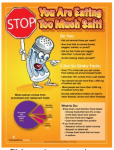Salt, Strokes, and Senility
Growing scientific data is linking the consumption of more salt with an increased risk of memory loss, stroke, and senility. For example, the November 8, 2011 issue of Neurology reported the results of a study that followed 23,752 older (mean age 64) people for 4 years. At baseline, all the subjects had tested normal for cognitive function. They also were assessed for stroke risk using the Framingham Stroke Risk Profile, which predicts the risk of stroke based on the person’s age, blood pressure, education level, history of heart disease (including atrial fibrillation and other heart rhythm problems), evidence of left ventricular hypertrophy, smoking and diabetes status. During the next 4 years 1,907 of them developed loss of memory function and/or thinking problems. Of the 25% who scored the highest on the stroke risk profile (12 or more pts) 15% developed signs of senility compared to only 3% of the 25% whose initial stroke risk score was the lowest. The study found that older age, increased systolic blood pressure and left ventricular hypertrophy were the only stroke risk factors independently predictive of future major loss of cognitive function.In Canada, another study assessed diet and physical activity level in 1,262 initially older adults. Over the next 3 years, the researchers found that the third that consumed the most salt (>3091mg sodium/day) were significantly more likely to lose cognitive function during the next 3 years compared to the third that consumed the least salt (<2263mg sodium/day). Those who were the least active and consumed the most salt experienced the greatest loss of brain function. However, those who were sedentary but also consumed a diet with less salt showed no decline in cognitive function (1). Another study done in New York City and presented at the American Stroke Association International Conference in Los Angeles last February followed 2,657 middle-aged and older adults for 10 years. Over the 10 years, 227 subjects suffered an ischemic stroke. The result showed a strong association between salt intake and the risk of a subsequent stroke. For every 500mg increase in dietary sodium, the subjects were 18% more likely to suffer a stroke. The researchers noted that 21% of subjects were initially consuming more than 4,000mg of sodium, so they may have cut their risk of stroke by more than 90% had they reduced their sodium intake to less than 1500mg per day as is now recommended for most people by the US Dietary Guidelines, Center for Disease Control, and American Heart Association.By James J. Kenney, PhD, FACN1 Fiocco AJ, et al. Sodium intake and physical activity impact cognitive maintenance in older adults: the NuAge Study. DOI: 10.1016/j. neurobiolaging. 2011.07.004Brought to you by: TheNutritionEducationStore.com. Check out posters, PowerPoint Shows, games, and handouts that all discuss fiber, its impact on health, sources of each type of fiber, and much more!

